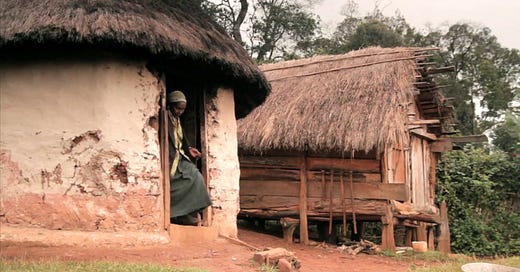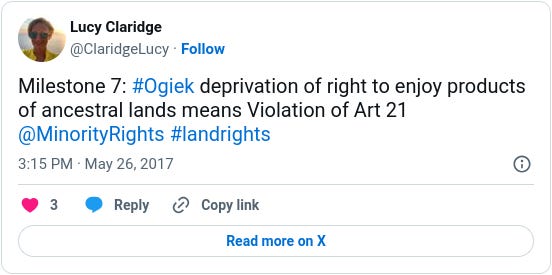The Ogiek win huge land rights victory in Kenya

The Ogiek are one of the last groups of hunter gatherers in Kenya. Their ancestral land is in the Mau Forest in the Rift Valley of Kenya. For many years, the Kenyan government has threatened them with eviction, in the name of conservation. Last week, the African Court on Human and Peoples’ Rights ruled that the Ogiek have the right to live in the Mau Forest and that the government of Kenya was wrong to evict them.
Lucy Claridge is a human rights lawyer who works with the Minority Rights Group International. She was the lead lawyer for the Ogiek. She told the BBC World Service that,
“This is an extremely positive outcome. It sends a very clear message to the government of Kenya, but also to other governments in Africa, that they must respect the rights of their indigenous communities, and that includes their land rights.”
Daniel Kobei, Executive Director of Ogiek Peoples’ Development Programme, said in a statement,
“For the Ogiek, this is history in the making. The issue of Ogiek land rights has finally been heard and the case has empowered them to feel relevant. I know that the case also gives hope to other indigenous peoples: it has made the issues seem real.”
And in a statement, Claridge explains the significance of the ruling:
“Crucially the Court has recognised that the Ogiek – and therefore many other indigenous peoples in Africa – have a leading role to play as guardians of local ecosystems, and in conserving and protecting land and natural resources, including the Mau Forest.”
Minority Rights points out that this is the first time that the African Court has ruled on an indigenous peoples’ rights case, since it was set up in 2006. It is the largest case ever brought before the Court.
This is the first time that the Ogiek’s rights to their ancestral land have been recognised. The African Court on Human and Peoples’ Rights is the highest human rights regional body, and Kenya is a party to the African Charter on Human and Peoples’ Rights. As Claridge explained to the BBC, this means that Kenya has to abide by the ruling.
Victory after eight years
In the judgement the African Court gave a timeline of the legal case:
In October 2009, the Kenya Forest Service issued an eviction notice, that required the Ogiek and other settlers to leave the Mau Forest within thirty days.
On 14 November 2009, Minority Rights Group International, Ogiek Peoples’ Development Program, and the Center for Minority Rights Development wrote to the African Commission on Human and Peoples’ Rights about the eviction notice.
On 23 November 2009, the African Commission requested the Kenyan government to suspend the evictions.
On 12 July 2012, following the lack of response from the Kenyan government, the African Commission referred the case to the African Court.
At its 36th session, from 9 March to 27 March 2015, the African Court decided to propose to the Kenyan government and the Ogiek that “they engage in amicable settlement”. This attempt to settle the matter did not succeed.
At its 40th session, from 29 February to 18 March 2016 the African Court decided to proceed with the case.
The Mau Forest Complex covers about 400,000 hectares. It was the largest area of forest in East Africa, but today large parts of it have been deforested. 35,000 Ogiek people are the claimants in this case. The Kenyan government argues that the Mau Forest is a water catchment and that the land belonged to the government.
The full ruling is available on the African Court’s YouTube account, here, here, and here.
UPDATE – 30 May 2017: The full court judgment is available here.
Court confirms that the Mau Forest is the Ogiek’s ancestral home
The African Court stated that the Mau Forest is the Ogiek’s ancestral home, that the Ogiek rely on the forest for their livelihoods, religious and cultural life. The Court also stated that conservation of the forest was not a sufficient reason for evicting the Ogiek. It ruled that there was no evidence that the Ogiek had destroyed the forest, or that evictions of the Ogiek helped to protect the forests.
The African Court noted that the Mau Forest has been handed over to others, who are destroying the forest. In 2009, the New York Times reported that,
It was clear that timber companies are continuing to chew up large tracts of the Mau, knocking down giant trees and turning them into doors and plywood for export.
Violations of the African Charter on Human and Peoples’ Rights
The African Court ruled that the Kenyan government violated seven articles of the African Charter.
In a series of “milestone” tweets, Claridge explains why the ruling is so important and how the government of Kenya violated the African Charter.
Article 14
The right to property shall be guaranteed. It may only be encroached upon in the interest of public need or in the general interest of the community and in accordance with the provisions of appropriate laws.
Article 2
Every individual shall be entitled to the enjoyment of the rights and freedoms recognized and guaranteed in the present Charter without distinction of any kind such as race, ethnic group, color, sex, language, religion, political or any other opinion, national and social origin, fortune, birth or other status.
Article 8
Freedom of conscience, the profession and free practice of religion shall be guaranteed. No one may, subject to law and order, be submitted to measures restricting the exercise of these freedoms.
Article 17
2. Every individual may freely, take part in the cultural life of his community.
3. The promotion and protection of morals and traditional values recognized by the community shall be the duty of the State.
Article 21
1. All peoples shall freely dispose of their wealth and natural resources. This right shall be exercised in the exclusive interest of the people. In no case shall a people be deprived of it.
2. In case of spoliation the dispossessed people shall have the right to the lawful recovery of its property as well as to an adequate compensation.
3. The free disposal of wealth and natural resources shall be exercised without prejudice to the obligation of promoting international economic cooperation based on mutual respect, equitable exchange and the principles of international law.
4. States parties to the present Charter shall individually and collectively exercise the right to free disposal of their wealth and natural resources with a view to strengthening African unity and solidarity.
5. States parties to the present Charter shall undertake to eliminate all forms of foreign economic exploitation particularly that practiced by international monopolies so as to enable their peoples to fully benefit from the advantages derived from their national resources.
Article 22
1. All peoples shall have the right to their economic, social and cultural development with due regard to their freedom and identity and in the equal enjoyment of the common heritage of mankind.
2. States shall have the duty, individually or collectively, to ensure the exercise of the right to development.
Article 1
The Member States of the Organization of African Unity parties to the present Charter shall recognize the rights, duties and freedoms enshrined in this Chapter and shall undertake to adopt legislative or other measures to give effect to them.
















